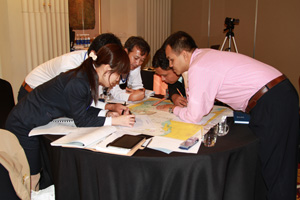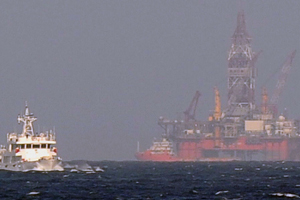Exploring an Integrated Approach to International Boundary and Territorial Questions
Conference Workshops
The 2015 London International Boundary Conference workshops will involve a combination of lectures and practical sessions using a fictional scenario
designed around issues present within maritime delimitation.
 Workshop #1: How to Draw Maritime Boundaries: A Practical Approach to Delimitation
Workshop #1: How to Draw Maritime Boundaries: A Practical Approach to Delimitation
30 November 2015. 13:00pm – 17:00pm
Department of Geography, King's College London
Fourth Floor, Pyramid Room
King's Building, Strand, London WC2R 2LS
The first technical workshop of the London International Boundary Conference will take place at King's College on 30 November 2015. An initiative of Marbdy Consulting Ltd, the workshop will offer attendees the opportunity to gain a technical perspective of the practical approach to the resolution of maritime boundary disputes. The interactive workshop will also provide delegates with an understanding of maritime dispute principles before exploring an integrated approach to such disputes within the conference itself.
Delegates:
• Will learn how equitable maritime boundaries are derived and negotiated; and
• Will use first principles to negotiate such a boundary
Facilitated by:
Dr Robin Cleverly, Marbdy Consulting Ltd
 Workshop #2: Mineral Resources Beyond Oil and Gas and their Significance for Coastal States’ Maritime Boundaries
Workshop #2: Mineral Resources Beyond Oil and Gas and their Significance for Coastal States’ Maritime Boundaries
2 December 2015. 8:00am – 9:30am
The Royal Geographical Society, Education Centre
1 Kensington Gore, London SW7 2AR
The second workshop of the London International Boundary Conference will take place at the Royal Geographical Society on 2 December 2015. An initiative of Maritime Zone Solutions Ltd, the workshop will introduce delegates to potential non-living marine mineral resources and define their likely criteria for occurrence both within EEZs and continental shelf areas beyond 200 nautical miles. Using examples taken from real locations and theoretical settings, the workshop will give the delegates the opportunity to assess preliminary resource potential, feasibility for recovery and possible economic implications for maritime boundary delimitation.
Delegates:
• Will learn about mineral resources such as gas hydrates, seafloor sulphides, cobalt crusts and nodules, as well as conventional oil and gas deposits; and
• Will be provided with a series of maps illustrating various seafloor characteristics to review during the course, and with a fully illustrated and detailed analysis package covering the examples worked on at the conclusion of the workshop.
Facilitated by:
Dr Lindsay Parson, Dr Rosemary Edwards and Ms Bethan Owens
Maritime Zone Solutions Ltd